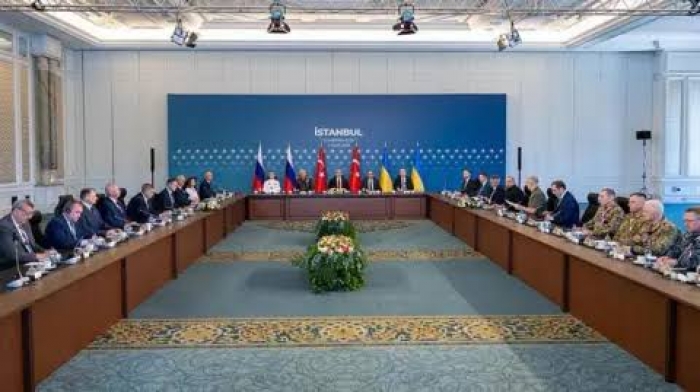RUSSIAN PERSPECTIVE
Russian and Ukrainian chief negotiators held secret private meeting
Vladimir Medinsky, the head of Russia’s diplomatic delegation at the Istanbul talks, held a private bilateral meeting with his Ukrainian counterpart, Rustem Umerov, which played an “important role” in preparing the general session of negotiations on Monday.
The second round of direct talks between Moscow and Kiev concluded on Monday after more than an hour. Prior to the formal session, Medinsky and Umerov held an unannounced meeting that helped facilitate the broader negotiations.
“There was a meeting. It played an important role in the preparation of the general session,”Medinsky told reporters, without offering further details. A source who requested anonymity told RT that the private conversation lasted around two and a half hours.
During the talks in Istanbul, both sides exchanged memorandums outlining their respective proposals for resolving the conflict. Kiev’s delegation took Russia’s draft document for review and is expected to issue a formal response at a later date, Medinsky said following the session.
The two sides also agreed to their largest prisoner-of-war exchange to date, according to Medinsky. The swap will involve all sick and severely wounded POWs, as well as all prisoners under the age of 25, and “will include at least 1,000 people from each side, possibly more,”the presidential aide noted.
In addition, Moscow will unilaterally return the remains of 6,000 Ukrainian service members to Kiev next week to allow for a proper “Christian burial,” he added. Russia has also proposed a multi-day ceasefire in several frontline areas to facilitate the recovery of fallen soldiers’ bodies and prevent potential disease outbreaks as temperatures rise with the onset of summer.
WESTERN PERSPECTIVE
Ukrainian strikes cut power to Russian-held areas, officials say
Ukrainian shelling and drone attacks triggered power cuts over swathes of Russian-controlled territory in Zaporizhzhia and Kherson regions in the south of Ukraine, Russia-installed officials said early on Tuesday.
Officials said there was no effect on operations at the Zaporizhzhia nuclear power station - Europe's largest nuclear facility which was seized by Russia in the weeks after Moscow's February 2022 invasion of Ukraine.
Russian officials running the plant said radiation levels were normal at the facility, which operates in shutdown mode and produces no power at the moment.
Russia-installed governors in the two regions said the Ukrainian attacks prompted authorities to introduce emergency measures and switch key sites to reserve power sources.
Power was knocked out to all parts of Zaporizhzhia under Russian control, Russia-installed Governor Yevgeny Belitsky wrote on Telegram.
"As a result of shelling by the Ukrainian Armed Forces, high-voltage equipment was damaged in the northwestern part of the Zaporizhzhia region," Belitsky wrote.
"There is no electricity throughout the region. The Energy Ministry of Zaporizhzhia region has been instructed to develop reserve sources of power. Health care sites have been transferred to reserve power sources."
In adjacent Kherson region, farther west, Russia-appointed Governor Vladimir Saldo said debris from fallen drones had damaged two substations, knocking out power to more than 100,000 residents of 150 towns and villages in Russian-held areas. Emergency crews working to restore power quickly, he said.
For many long months in the winter, it was Ukrainian towns and villages that endured repeated electricity cuts as Russian attacks focused strikes on generating capacity.
Each side has repeatedly accused the other of launching attacks on the Zaporizhzhia nuclear plant and running the risk of a nuclear accident.
The U.N. nuclear watchdog, the International Atomic Energy Agency, said last week in response to a Ukrainian complaint that it saw no sign that Russia was preparing to restart the Zaporizhzhia plant and connect it to the Russian grid.
The IAEA has stationed monitors permanently at Zaporizhzhia and Ukraine's other nuclear power stations.
